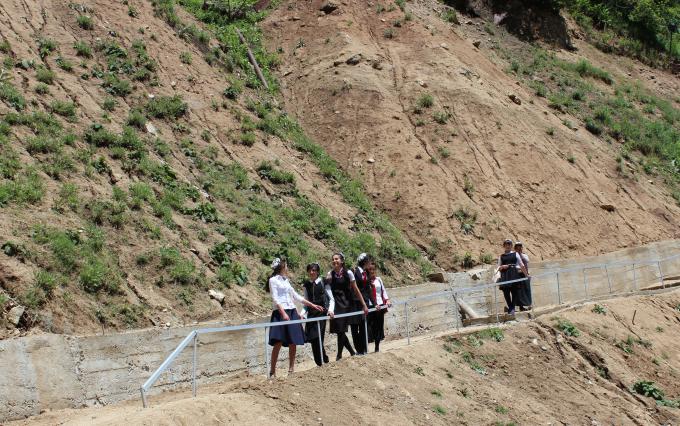Reconstruction of a Village road builds community, safety for local children in Tajikistan
New construction and building of infrastructure is well underway in remote villages in Tajikistan. These construction projects are being conducted under the framework of the European Union funded DIPECHO VIII project, “Increasing Resilience of Institutions, Communities and Most Vulnerable Groups to Natural Disasters in Tajikistan and Kyrgyzstan.” In order to build sustainable change, funds for small scale mitigation projects have been a main activity for the project which is being implemented by Save the Children International in Tajikistan.
For that purpose, trainings were organized in 20 targeted villages of Varzob and Vakhdat districts concerning how to write small scale proposals and how to identify and prioritise existing problems within their communities. Based on the community needs, construction materials for mitigation projects were delivered and distributed to 18 targeted villages for cleaning of 6 mudflow collectors, strengthening the coasts of 5 channels and dams, construction of 3 bridges, prevention of rock falling in 2 villages, 1 road reconstruction and 1 school ‘safe place’ reconstruction. To date, implementation of all planned projects have been completed.
In Khoji Obigarm village, Varzob district, reconstruction of a main road connecting two parts of the village has special significance.
“This road was and is the only road connecting two parts of the village with a main road and serves as the only way out in case of disasters to evacuate people living on the hills. At the same time it is a road that our children use to go to school every day. Before the construction it was really dangerous. The small scale mitigation project totally transformed the road. Before it was just a ramp and now it is a very convenient concrete road with stairs and handles,” said Yorov Tesha, Head of the Community Emergency Response Team of the Khoja Obigarm village located In Varzob district.
This success of this road reconstruction represents strong ongoing community participation and cooperation. Begov Shodi, teacher at School #4 in Khoji Obigarm, said that they had been planning this project for a long time but had lacked the proper funds. Tesha added that: “Save the Children through DIPECHO VIII project granted funds for the reconstruction of a road in our village and all our population supported this initiative through active participation in construction of the road.”
Most importantly, the community is learning relevant skills for their own development. Yorov stated that: “We may have solved only one problem, but now and we are prepared to continue and we feel that we can completely change our lives for the better thanks to DIPECHO VIII and Save the Children for this effort.”
The success of this road reconstruction is due to the community gaining a strong understanding of disaster risk reduction. They worked together to create a joint effort in order to eliminate existing dangers. This collaboration will make the community more resistant to withstand natural disasters and to keep the inhabitants, especially the children, safe.
“We will be able to use this road not only in emergencies but for daily use as well. Now our schoolchildren can safely reach school without their parents being worried. Thanks to the EU funding and Save the Children staff, the community here has found peace and confidence in the future,” said Shodi.
This project has been funded with support from the European Commission. This article reflects the views only of the author, and the Commission cannot be held responsible for any use which may be made of the information contained therein.
 Central Asia
Central Asia 